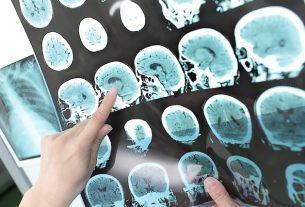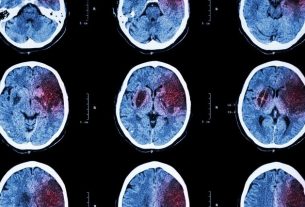The feeling of fainting can be caused by strong emotions, panic attacks, sudden changes in body position, prolonged exposure to heat, anemia, hypoglycemia, heart attack or stroke, for example.
Normally, the feeling of fainting, known scientifically as lipothymia, is accompanied by other symptoms such as dizziness, paleness or cold sweat, and passes within a few minutes, without causing loss of consciousness. Check out all the symptoms of lipothymia.
However, when the feeling of fainting does not go away, is frequent or causes fainting, you should go to the emergency room immediately so that the cause can be identified and, thus, the most appropriate treatment can be started.

12 causes of feeling faint
The main causes of feeling faint are:
1. Strong emotions
Strong emotions such as stress, fear, pain or anxiety can cause a feeling of fainting.
This is because in these situations an involuntary reflex may occur in the body that stimulates the vagus nerve, resulting in a drop in blood pressure and heart rate, which briefly reduces blood flow to the brain.
What to do: It is important to look for ways to relax to reduce stress and anxiety. Furthermore, undergoing psychotherapy can be useful in learning to deal with emotions.
Don’t ignore your symptoms!
2. Panic attack
A panic attack is a manifestation of panic syndrome or anxiety disorders, which can cause intense physical and emotional symptoms.
The main symptoms of a panic attack are a feeling of fear, shortness of breath, tightness in the chest, racing heart, tremors, intense sweating, feeling faint and anxiety.
These symptoms are usually recurrent, appear suddenly, increase in intensity within a few minutes and improve within 5 to 20 minutes.
What to do: go to a safe place, inhale deeply through your nose and exhale slowly through your mouth and try to remain calm, remembering that the panic episode will pass in a few minutes. Here’s what to do during a panic attack.
In addition, you should consult a psychologist and, if necessary, take antidepressants or anxiolytics prescribed by the psychiatrist.
3. Sudden changes in position
Sudden changes in position, such as rising quickly from a sitting or lying position, can cause a rapid decrease in blood pressure and make you feel faint.
This rapid drop in blood pressure, also known as orthostatic hypotension, may be accompanied by other symptoms such as darkening of vision, mental confusion or dizziness, for example. Know how to identify the symptoms of orthostatic hypotension.
What to do: It is recommended to get up slowly from a sitting or lying position to avoid a sudden drop in blood pressure, especially in the elderly, as this can increase the risk of falls and bone fractures.
4. Standing for a long time
Standing for a long time can result in blood pooling in the legs and causing difficulty for the calves to pump blood from the legs to the heart, and can also reduce blood flow to the brain and make you feel faint.
Additionally, standing for a long time can also cause swelling in your legs, feet, or ankles.
What to do: you should avoid standing for long hours. If this is not possible, it is important to flex your knees and ankles every hour or stand up on your toes to help your calves pump blood from your legs to your heart, reducing the risk of feeling faint.
5. Hypoglycemia
Hypoglycemia is a sharp reduction in blood glucose, resulting in symptoms such as dizziness, tremors, cold sweat, pale skin, heart palpitations, mental confusion or a feeling of fainting, for example. Know how to identify all the symptoms of hypoglycemia.
Hypoglycemia generally occurs when there is some dysregulation of treatment in people with diabetes who use insulin or other antidiabetics, but it can also occur due to going without food for a long time, consuming alcoholic beverages or practicing intense physical exercise.
What to do: eating in small amounts at intervals of less than 2 to 3 hours can help prevent hypoglycemia. However, if symptoms appear, you should drink natural orange juice or eat sweets or chocolates, for example, to increase blood glucose quickly.
Furthermore, people being treated for diabetes should have regular follow-ups with an endocrinologist to carry out tests that measure blood glucose levels and evaluate the dose of diabetes medication.
6. Prolonged exposure to heat
Prolonged exposure to heat can cause an abnormal increase in body temperature, known as hyperthermia, and result in a feeling of fainting and dizziness. Understand better what hyperthermia is.
In addition to the feeling of fainting, other symptoms that may appear are excessive sweating, dizziness, nausea, mental confusion or even convulsions.
This prolonged exposure to heat can occur due to being in places with high temperatures, making physical efforts, working or wearing excess clothing in very hot and humid climates, for example. See other causes of hyperthermia.
What to do: you should go to a shade or a cooler area, drink plenty of cold water, drinks with electrolytes or homemade serum, to keep the body hydrated and remove excess clothing, tight or heavy clothes. If symptoms do not improve, you should go to the emergency room immediately to undergo treatment that involves applying serum into a vein and cooling the body.
7. Heart attack
A heart attack is the abrupt interruption of blood flow to the heart, which causes the death of cardiac cells in the affected region, causing symptoms such as chest pain that can radiate to the neck, jaw, armpit, back, arm, left shoulder or even , for the right shoulder and arm.
This pain in the chest, shoulder and arm may be accompanied by other symptoms, such as dizziness, malaise, nausea, cold sweat, paleness, feeling faint or syncope. See all heart attack symptoms.
What to do: You should seek medical help immediately or the nearest emergency room if heart attack symptoms appear, as it is a serious condition that can put your life at risk.
This way, it is possible to start treatment immediately, with medication, catheterization or angioplasty to regulate the flow of blood to the heart and avoid complications. Find out how heart attack is treated.
8. Cardiac arrhythmia
Cardiac arrhythmia is a change in the normal rhythm of the heart’s beats, which can beat faster or slower, and cause symptoms such as dizziness, feeling faint, weakness, chest pain, shortness of breath or general malaise.
Cardiac arrhythmia can be caused by a heart attack, high blood pressure, diabetes, heart valve or thyroid problems, sleep apnea or even medication use.
What to do: You should seek medical help as soon as possible or the nearest emergency room, so that the type of arrhythmia and its cause can be diagnosed, and the most appropriate treatment can be started. See how arrhythmia is treated.
9. AVC
Stroke or other neurological diseases, such as Parkinson’s disease, brain tumor or Alzheimer’s, for example, can cause dizziness, loss of balance and feeling faint.
Other symptoms of stroke are lack of strength on one side of the body, slurred or slow speech, crooked mouth and drooping eyebrows, for example. Know how to identify stroke symptoms.
What to do: If you suspect a stroke, you should go to the nearest emergency room immediately, as it is a medical emergency that requires immediate treatment. For other neurological diseases, treatment must be carried out by a neurologist who can recommend specific remedies for the disease to be treated.
10. Iron deficiency anemia
Iron deficiency anemia is caused by iron deficiency, which is important for producing hemoglobin and forming red blood cells, which are cells that transport oxygen to the body’s tissues.
Thus, the reduction of oxygen, especially in the brain, can result in a feeling of fainting, dizziness, drowsiness, excessive tiredness, paleness or shortness of breath, for example.
What to do: The treatment of iron deficiency anemia must be carried out according to the guidance of the hematologist and normally includes the use of iron supplements, in addition to the consumption of foods rich in iron such as lentils, parsley, beans and red meat, for example. See how to make a diet rich in iron.
11. Labyrinthitis
Labyrinthitis is an inflammation of the labyrinth in the ear, responsible for hearing and balance, and can cause dizziness, vertigo, lack of balance, hearing loss, nausea or a feeling of fainting. Check out other symptoms of labyrinthitis.
Labyrinthitis is more common in the elderly, but it can happen at any age, and be caused by respiratory infections, diabetes, high blood pressure or even emotional factors such as stress, anxiety or depression, for example.
What to do: You should consult an otorhinolaryngologist to begin appropriate treatment, which can include anti-vertigo and/or anti-emetic medications to help alleviate symptoms, or antibiotics if you have bacterial infections. Furthermore, it is recommended to avoid stress and the consumption of caffeine, sugar and cigarettes, which are situations that can worsen the dizziness crisis. See how labyrinthitis is treated.
12. Side effects of some medicines
Some medications, such as antihypertensives or diuretics, can cause a sharp drop in blood pressure as a side effect and result in a feeling of fainting.
Generally, this side effect is related to very high doses of these medications.
What to do: you should consult the doctor responsible for the treatment, so that the side effect of the medicine can be assessed, and if necessary, the doctor can change the dose or change the medicine. Under no circumstances should you interrupt treatment or change doses on your own.
How to avoid fainting
To avoid fainting, when you feel like fainting, you should immediately lie down with your legs elevated above the height of your heart, to facilitate blood flow to the brain.
If it is not possible to lie down, you should sit down, lower your torso forward, placing your head between your knees.
It is important to remain in one of these positions until the feeling of fainting passes.
When to go to the doctor
The feeling of fainting usually appears suddenly and improves within a few minutes, spontaneously.
However, it is important to go to the emergency room immediately in the following situations:
- Feeling of fainting that does not go away, is frequent or causes fainting;
- Chest pain that may radiate to the arm, neck, jaw or back;
- Nausea or vomiting;
- Lack or loss of balance;
- Lack of strength on one side of the body or difficulty speaking;
- Cold sweat, paleness, tremor or weakness;
- Heart palpitations or shortness of breath;
- Drowsiness or mental confusion.
Furthermore, for people who have a history of illnesses, such as diabetes, epilepsy or heart problems, it is always important to go to the hospital when they feel faint.
In all cases, the doctor carries out an assessment of symptoms and health history, in addition to requesting tests so that the cause of the fainting sensation can be diagnosed and thus indicate the most appropriate treatment.

Sign up for our newsletter and stay up to date with exclusive news
that can transform your routine!
Warning: Undefined array key "title" in /home/storelat/public_html/wp-content/plugins/link-whisper-premium/templates/frontend/related-posts.php on line 12
Warning: Undefined array key "title_tag" in /home/storelat/public_html/wp-content/plugins/link-whisper-premium/templates/frontend/related-posts.php on line 13



